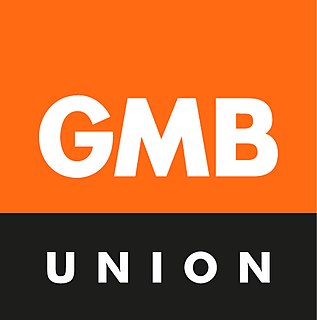Related Research Articles
In British politics, an affiliated trade union is one that is linked to the Labour Party. The party was created by the trade unions and socialist societies in 1900 as the Labour Representation Committee and the unions have retained close institutional links with it.

The GMB is a general trade union in the United Kingdom which has more than 631,000 members. Its members work in nearly all industrial sectors, in retail, security, schools, distribution, the utilities, social care, the National Health Service (NHS), ambulance service and local government.

The Bakers, Food and Allied Workers' Union (BFAWU) is a trade union in the United Kingdom. Founded in 1847 in Manchester, it represents workers in the food industry.

The Australian Manufacturing Workers Union (AMWU), or more fully the Automotive, Food, Metals, Engineering, Printing and Kindred Industries Union, is an Australian trade union. The AMWU represents a broad range of workers in the manufacturing sector, as well as associated industries, and is affiliated to the Australian Council of Trade Unions.

The Ceramic and Allied Trades Union (CATU) was a trade union representing pottery workers in the United Kingdom.

The Modern Records Centre (MRC) is the specialist archive service of the University of Warwick in Coventry, England, located adjacent to the Central Campus Library. It was established in October 1973 and holds the world's largest archive collection on British industrial relations, as well as archives relating to many other aspects of British social, political and economic history.
The National Association of Operative Plasterers (NAOP) was a trade union representing plasterers in the United Kingdom.

The Amalgamated Society of Boilermakers, Shipwrights, Blacksmiths and Structural Workers (ASB) was a trade union in the United Kingdom. Many of its members worked in shipbuilding, in which industry it was the leading trade union, while over time it also developed strength in engineering and construction.

The National Union of Tailors and Garment Workers (NUTGW) was a trade union in the United Kingdom.

The Irish Trades Union Congress (ITUC) was a union federation covering the island of Ireland.

The Confederation of Shipbuilding and Engineering Unions (CSEU), often known as the Confed is a trade union confederation in the United Kingdom.
Edward James Hill, Baron Hill of Wivenhoe, known as Ted Hill, was a British trade unionist. Known as a shrewd negotiator, Hill frequently succeeded in "wresting many concessions from unwilling employers."

The Shipconstructors' and Shipwrights' Association (SSA) was a trade union representing shipbuilders in the United Kingdom.

The National Union of Boot and Shoe Operatives (NUBSO) was a trade union in the United Kingdom which existed between 1873 and 1971. It represented workers in the footwear industry.
Sir Daniel McGarvey, CBE, known as Danny McGarvey, was a British trade unionist.
John Chalmers was a Scottish trade unionist.
The National Union of Foundry Workers (NUFW) was a trade union representing workers in foundries in the United Kingdom.

The Amalgamated Society of Dyers, Finishers and Kindred Trades was a trade union representing dyers and workers in related jobs in the United Kingdom.
The Joint Committee of Light Metal Trades Unions (LMTU) was a trade union committee consisting of unions based in the United Kingdom with members involved in producing castings for industry and construction.
James Neil Jarvie was a British trade unionist who became the leader of the Blacksmiths union.
References
- 1 2 3 John B. Smethurst and Peter Carter, Historical Directory of Trade Unions, vol.6, pp.314-320
- ↑ "Obituary: Mr J. Thomson, OBE, JP", Annual Report of the 1919 Trades Union Congress, p.205
- ↑ Parker, James (2017). Trade unions and the political culture of the Labour Party, 1931-1940 (PDF). Exeter: University of Exeter. p. 125.